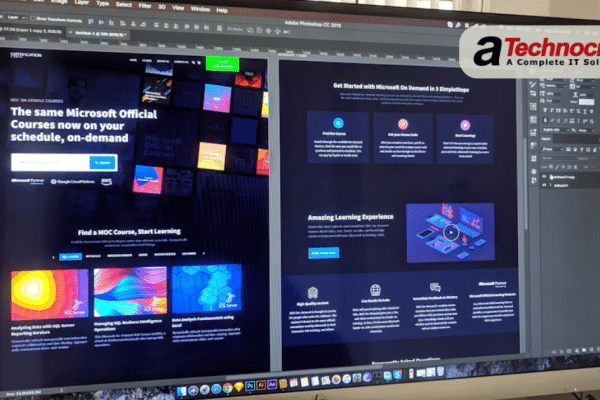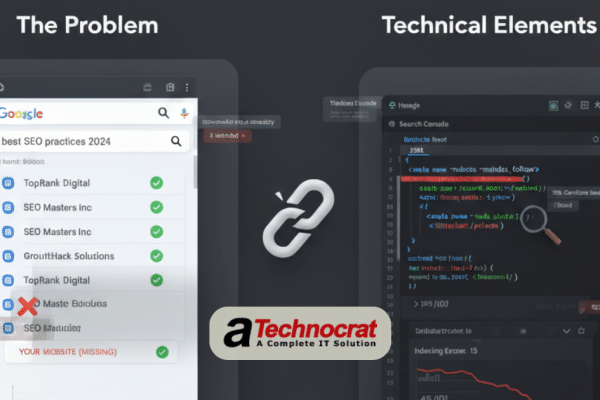You need a website for your business. The big question is: should you choose a custom website vs template solution? This choice affects everything from your budget to how customers see your brand. Make the wrong decision and you’ll waste money or limit your business growth. Make the right choice and your website becomes a powerful business tool.
After building 500+ websites for Indian businesses over the past decade, we see this dilemma constantly. Business owners get confused by conflicting advice. Template companies promise quick, cheap solutions. Custom developers talk about unique designs and advanced features. Both have valid points, but neither tells the whole story.
The truth is more nuanced. The right choice depends on your specific business needs, budget, and growth plans. A template might be perfect for one business while limiting another. Custom development could be essential for some companies but overkill for others. This comparison will help you decide which path makes sense for your business. We’ll cover real costs, hidden expenses, performance differences, and long-term implications. By the end, you’ll know exactly which option fits your situation.
What Are Template and Custom Websites?
Template websites start with pre-designed layouts and structures. You choose a design, add your content, and customize colors and images. Popular platforms like WordPress themes, Wix templates, and Squarespace designs work this way. The basic structure and functionality already exist. You’re essentially renting and customizing someone else’s design.
Custom websites get built from scratch specifically for your business. Developers create unique designs, write custom code, and build features that match your exact needs. Nothing gets reused from other projects. Every element gets designed and programmed specifically for your business requirements.
Both approaches have their place in the market. Templates work well for businesses with standard needs and limited budgets. Custom development suits businesses with unique requirements or specific growth plans. The key is matching your choice to your actual business situation.
The development process differs significantly between these approaches. Template projects typically take days or weeks to complete. You’re mainly adding content and making design adjustments. Custom projects take months because everything gets built from the ground up. This time difference affects both cost and when you can launch your website.
Cost Comparison: Initial Investment and Long-term Expenses
Template Website Costs:
- Premium template: ₹5,000 – ₹25,000
- Setup and customization: ₹15,000 – ₹50,000
- Total initial cost: ₹20,000 – ₹75,000
- Annual maintenance: ₹10,000 – ₹30,000
Custom Website Costs:
- Design and development: ₹1,50,000 – ₹8,00,000
- Advanced features: ₹50,000 – ₹3,00,000 additional
- Total initial cost: ₹2,00,000 – ₹11,00,000
- Annual maintenance: ₹25,000 – ₹75,000
Hidden costs affect both options but in different ways. Templates often require paid plugins for advanced features. Each plugin adds monthly or yearly fees. Security updates, backups, and performance optimization also cost extra. Many businesses spend more on these additions than the original template price.
Custom websites have higher upfront costs but fewer surprises later. Most functionality gets built in from the start. Maintenance costs stay predictable because you control all the code. You’re not dependent on third-party plugins or theme developers for updates.
5-Year Total Cost Comparison:
- Template website: ₹1,00,000 – ₹2,50,000
- Custom website: ₹3,00,000 – ₹15,00,000
ROI studies show that businesses with custom websites typically see 15-25% higher conversion rates, which can justify the higher investment for many companies.
Template Websites: Advantages and Limitations
Template Advantages: Templates get you online quickly. Most template websites launch within 2-4 weeks. This speed helps businesses that need immediate online presence. The lower initial cost makes templates accessible for small businesses and startups with tight budgets.
Template platforms handle technical details like hosting, security updates, and backups. You don’t need technical expertise to manage basic website functions. Many templates include built-in SEO tools and mobile responsiveness. Popular platforms offer customer support when you run into problems.
The variety of available designs is impressive. Thousands of templates exist for different industries and business types. You can preview exactly how your website will look before buying. This removes guesswork from the design process.
Template Limitations: Design flexibility has strict limits. You can change colors, fonts, and images but not the basic layout structure. Your website ends up looking similar to others using the same template. Standing out from competitors becomes difficult when many businesses use identical designs.
Functionality restrictions create bigger problems as businesses grow. Templates include specific features, and adding new capabilities often requires expensive plugins or isn’t possible at all. E-commerce templates might limit product variations or payment options. Service business templates might not support appointment booking systems.
Performance issues develop over time. Templates include code for features you don’t use, which slows loading speeds. Multiple plugins create conflicts and security vulnerabilities. You depend on template developers to fix problems and add new features.
Templates Work Best For:
- Small businesses with standard needs
- Quick launch timelines (under 1 month)
- Limited budgets (under ₹1 lakh total)
- Simple websites with basic functionality
- Businesses that don’t plan major growth or changes
Custom Websites: Advantages and Limitations
Custom Advantages: Complete design control means your website looks exactly how you want. Every element gets created specifically for your brand and business needs. This uniqueness helps you stand out from competitors using template websites. Your brand identity stays consistent across all design elements.
Functionality gets built to match your specific business processes. Need a custom quotation system? Integration with your inventory management? Specialized booking features? Custom development makes all of this possible. You’re not limited by what templates or plugins offer.
Scalability becomes much easier with custom websites. As your business grows, developers can add new features and sections without rebuilding everything. The code structure supports expansion and modifications. This flexibility saves money long-term compared to switching platforms.
Performance optimization happens from the beginning. Custom websites only include code you actually need. This results in faster loading speeds and better search engine rankings. Google research shows that site speed directly impacts conversion rates, with every second of delay reducing conversions by up to 20%.
Custom Limitations: Higher initial investment puts custom development out of reach for some businesses. The cost difference can be 3-5 times higher than template solutions. This upfront expense requires careful budget planning and clear ROI expectations.
Longer development timelines mean waiting 8-16 weeks for launch. Businesses needing immediate online presence might find this delay problematic. The development process requires more involvement from business owners for feedback and approvals.
Technical dependency on developers continues after launch. While many updates are simple, major changes or new features require professional help. You can’t easily switch to a new developer because they need to understand your custom code.
Custom Development Works Best For:
- Businesses with unique processes or requirements
- Companies planning significant growth
- Brands requiring distinctive online presence
- E-commerce with complex product catalogs
- Service businesses with specialized booking or quotation needs
- Companies with integration requirements (CRM, inventory, accounting systems)
Performance and Functionality Comparison
Loading speed differences between custom and template websites are significant. Custom websites typically load 30-50% faster because they only include necessary code. Templates carry extra code for features you might never use. This bloated code slows down every page load.
SEO capabilities vary dramatically between the two approaches. Custom websites can implement advanced SEO strategies like schema markup, optimized URL structures, and custom meta data systems. Template SEO depends on built-in tools and plugins. While basic SEO works fine with templates, advanced optimization often requires custom development.
Mobile responsiveness quality differs substantially. Custom websites get designed mobile-first with your specific content and user behavior in mind. Template responsiveness follows generic patterns that might not work well for your business type. A restaurant website needs different mobile features than an accounting firm.
Security considerations favor custom development for sensitive business data. Custom websites have unique code that hackers can’t easily target with generic attacks. Templates are popular targets because millions of websites use the same code. However, template platforms do provide regular security updates, while custom websites depend on your developer for security maintenance.
Integration possibilities are virtually unlimited with custom development. Need to connect your website to your inventory system? Sync with your accounting software? Create automated workflows between different business tools? Custom development makes complex integrations possible. Templates rely on available plugins, which might not exist for your specific needs.
Database structure and content management systems can be optimized for your specific content types with custom development. Templates use generic database structures that work for most businesses but aren’t optimized for any specific use case.
Long-term Business Impact
Scalability affects how your website grows with your business. Custom websites adapt easily to new requirements. Want to add a customer portal? Expand into new product categories? Create automated business processes? Custom websites can evolve with these changes. Templates often require complete rebuilds when business needs outgrow the original design.
Maintenance and update requirements differ between the two approaches. Template websites depend on theme developers and plugin creators for updates. If they stop supporting your template or plugin, you’re stuck with outdated, potentially insecure code. Custom websites require maintenance, but you control the timeline and priorities.
Competitive advantage considerations matter more as your business grows. Template websites look similar to competitors using the same themes. Custom websites create unique user experiences that competitors can’t easily copy. This differentiation becomes valuable for business growth and brand recognition.
Brand differentiation possibilities expand significantly with custom development. Every aspect of user experience can be optimized for your specific customers and business goals. Templates force your business processes to fit the template’s assumptions about how websites should work.
Ownership and portability issues affect long-term flexibility. With templates, you’re often locked into specific platforms. Moving your website to a different system can be difficult or impossible without starting over. Custom websites belong to you completely. You can move hosting, change developers, or modify anything you want.
Studies show that businesses with custom websites report 40% higher customer satisfaction with their online experience compared to template-based websites.
Decision Framework: Choosing the Right Option
Choose Custom Website Development If:
- Your annual revenue exceeds ₹50 lakhs
- You have unique business processes that don’t fit standard templates
- Integration with existing business systems is required
- Your industry has specific compliance or security requirements
- You plan to scale operations significantly in the next 2-3 years
- Brand differentiation is crucial for your business success
- You need advanced e-commerce features like complex product configurations
- Customer portal or member areas are part of your business model
Choose Template Website If:
- You’re just starting and need to test market demand
- Your budget is under ₹1 lakh for the entire project
- You need to launch within 2-4 weeks
- Your business model is straightforward with standard requirements
- You don’t plan major changes or growth in the next 2 years
- Basic online presence is your primary goal
- You’re comfortable with design limitations
Budget vs. Needs Assessment Questions:
- What specific features must your website have?
- How important is unique design for your brand?
- Do you need integration with other business software?
- What’s your total budget including 3 years of maintenance?
- How quickly do you need to launch?
- What are your growth plans for the next 3-5 years?
Timeline Considerations: Template projects: 2-6 weeks from start to launch Custom projects: 8-16 weeks depending on complexity Factor in content creation time for both options
Growth Planning Questions:
- Will you add new product lines or services?
- Do you plan to expand to new geographic markets?
- Will you need advanced analytics or reporting features?
- Are there industry regulations you might need to comply with?
Common Misconceptions
“Templates are always cheaper” – This misconception ignores long-term costs. Templates often require expensive plugins, premium features, and eventual redesigns. A ₹50,000 template website might cost ₹2 lakhs over 3 years with all the additions needed for business growth.
“Custom sites take too long” – While custom development takes longer initially, template customization often takes longer than expected. Complex template modifications can take months because developers work around existing code limitations. Custom sites have predictable timelines because everything is planned upfront.
“Templates can do everything” – Templates work for common business needs but struggle with unique requirements. A manufacturing company needing custom quotation systems or a service business with complex booking rules will find template limitations frustrating and expensive to work around.
“Custom sites are only for large businesses” – Many small businesses benefit from custom development. A local restaurant with online ordering, a consulting firm with client portals, or a retail store with unique product configurations can justify custom development costs through increased sales and efficiency.
“Template maintenance is easier” – While templates handle some technical updates automatically, they also break more frequently. Plugin conflicts, theme updates that change functionality, and compatibility issues create ongoing maintenance headaches. Custom websites have more predictable maintenance requirements.
Conclusion and Next Steps
The custom website vs template decision comes down to matching your business needs with the right solution. Templates work well for simple, standard business requirements with limited budgets and quick timelines. Custom development makes sense for businesses with unique needs, growth plans, or brand differentiation requirements.
Start by honestly assessing your business requirements and budget. Use the decision framework questions to guide your evaluation. Consider both immediate needs and 3-5 year growth plans. The right choice should support your business goals without breaking your budget.
Don’t rush this decision. A poorly chosen website solution costs more to fix later than investing in the right approach initially. Take time to research options, get detailed quotes, and understand exactly what each approach includes.
Professional consultation helps when you’re unsure about the best path forward. Our website development company can assess your specific situation and recommend the most cost-effective solution. They can also identify potential issues before they become expensive problems.
Ready to make the right choice for your business? Schedule a free consultation to discuss your specific needs and get personalized recommendations. We’ll analyze your requirements and provide detailed cost estimates for both template customization and custom development options.



